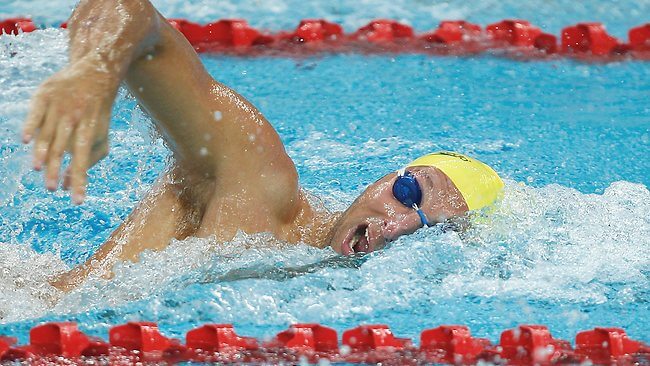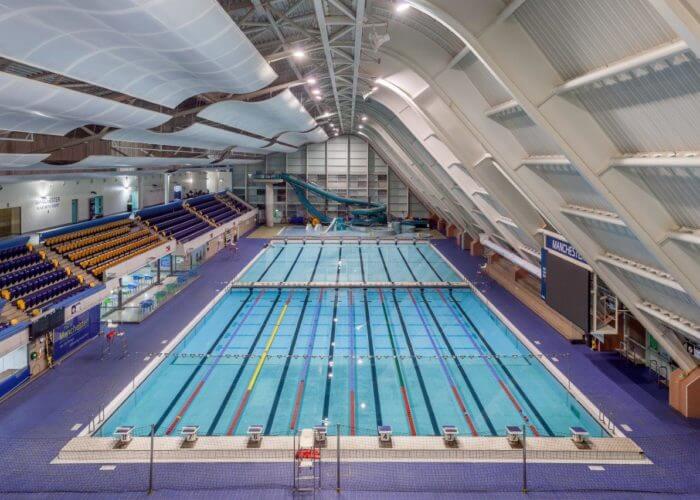Manchester Aquatics Centre Where Thorpe Went 3:40.08 Needs Funds Or May ‘Wither And Die’

Manchester Aquatics Centre – where Ian Thorpe went 3:40.08 over 400 free among a six-strong gold-medal haul at the 2002 Commonwealth Games – needs £31million ($42.3million) of investment in order to survive.
The facility in Manchester in the north-west of England is home to the British Para-Swimming national performance centre and has staged several national championships and the 2009 Duel in the Pool.
It is well remembered as the place where Thorpe set the 400 world record which stood for seven years before being eclipsed by Paul Biedermann‘s super-suited performance at the 2009 World Championships where the German cut 0.01 for a mark of 3:40.07 that still stands today.

Photo Courtesy: better.org.uk
It opened in 2000 but, according to Manchester City Council, two decades of intensive use has resulted in “a number of mechanical and electrical failures” with parts of the building approaching “the end of their natural lifespans.”
A document from the council says: “The pool treatment plan and pool lighting both need replacing, as do the moveable floors. Heating and electrical systems must be upgraded, lifts require refurbishing and the spa facility also needs to be replaced.”
It has been established that it will cost almost £31million to address the issues, refurbish the building and incorporate green technologies for the centre to reduce its carbon footprint.
Without significant investment, this would result in an increasing number of unplanned closures, cause the withdrawal of some services and make permanent closure of the flagship facility a serious threat.
Councillors have been asked to back an investment plan, stating that:
“Without significant investment, this would result in an increasing number of unplanned closures, cause the withdrawal of some services and make permanent closure of the flagship facility a serious threat.”
According to the local authority, the centre has welcomed more than 10million users since it opened – more than 500,000 a year – and it meets the demand of six community swimming pools.
It runs at a profit with revenue reinvested in leisure facilities which has an overall economic impact for the city of more than £4million ($5.4million) a year.
Pools in England are currently shut because of the lockdown as coronavirus cases soar across the country, something which has economic repercussions as well as a hugely detrimental impact on physical and mental health.
Many pools are in a precarious position and although Covid is not the sole reason for Manchester Aquatics Centre being under threat, the lack of paying customers will have had an impact.
The council executive will meet on 20 January with the full council convening on 3 February and if the investment plan is approved, work will take place on a phased basis over two and a half years to minimise disruption and ensure that access to at least one pool is maintained throughout.
The bulk of the funds – £29.1million ($39.6million) – will come through borrowing with another £1.3million ($1.8million) being funded through land and building sales.
Councillor Luthfur Rahman, Executive Member for Culture and Leisure, warned of the possible ramifications of not approving the investment, saying:
“This one-off investment will ensure that Manchester Aquatics Centre maintains its place as one of the leading aquatics venues in the UK for the next 20 years and more.
“This flagship facility is somewhere that everyone from beginners and school classes to Olympians and Paralympians can benefit from.
“Leisure has a crucial role to play in Manchester’s recovery from the social, health and economic impacts of the Covid-19 pandemic.
“It would be unthinkable to allow this key element of the city’s overall swimming provision, which also contributes to our global sporting reputation, to wither and die. But that is what would be likely to happen without serious investment.
“Delaying a decision to invest would only cost the city more in the coming years. Ongoing maintenance costs would rocket. Vital facilities for Manchester people and revenue for the city would be lost as building, mechanical and electrical failures caused more and more unscheduled closures.
“Instead we can grasp the opportunity to protect and improve the Aquatics Centre, bringing it up to the very latest standards and using green technologies to reduce its carbon footprint by 40 per cent, contributing towards the city’s drive to cut carbon emissions and saving on energy costs.”
Advertising: Shop At Swim360



